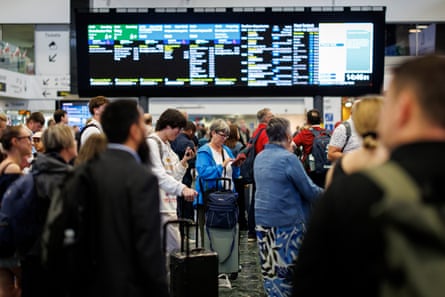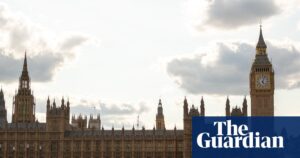August is peak flying time, and airports are on many minds. The government has signalled its support for colossal expansions, whose extra flights would bust its carbon pledges. The excuse is that supertechnology will magic away the extra CO2 pumped into the atmosphere, though it must know that clean, green flying is still futurology. Here’s the pity of it: until now this government has rightly boasted of its green credentials, making massive investments in sustainable energy and retro-insulating cold homes. Expanding air travel is not on any green agenda.
Heathrow has just submitted proposals for a £50bn third runway, as approved by Labour in 2009 and the Tories who voted it through parliament in 2018. Covid applied the brakes but now Heathrow is back with gold-plated, “shovel-ready” plans. Its owners, including Qatar, Singapore and Saudi Arabia, expect the planning bill to prevent newts or judicial reviews blocking the runway. Their pitch to an investment-hungry government is that expanding Europe’s busiest airport would create 100,000 new jobs, propelling growth with 750 extra daily flights.
Flying gets a green light from the transport secretary, Heidi Alexander: she agreed to double the size of Luton airport, favours Gatwick’s second runway for 100,000 more flights and gives Stansted’s expansion a fair wind. These allow a 70% increase in flights above 2018 levels, and cancel out all the carbon savings from the government’s clean power plan.
Rachel Reeves promised to be “Britain’s first green chancellor”, but her plans live or die on growth, so billions in private investment is hard to resist. But beyond construction, the growth-potential claims for extra flights look highly dubious. The promised global “connectivity” imagines business people zipping into Britain with briefcases full of contracts. But that’s not who these extra flyers will be. Most will be frequent flyers flying more frequently, not for business but for leisure, according to the New Economics Foundation and Possible, the climate campaign. National Travel and Civil Aviation Authority passenger surveys show only one in 14 UK passengers are business travellers. The pandemic showed that meeting online saves money and time; business travel has already peaked. Would extra flights bring in tourist income? No, 70% of flights are British tourists off abroad to spend vastly more than foreigners spend here.
Of extra flights in 20 years, 83% were taken by already frequent flyers, mostly for leisure. Growth will not be from more families taking an annual holiday: half the population doesn’t fly in any year, while just 15% consume 70% of flights. Nearly a third are “ultra-frequent flyers” taking six or more journeys a year. Instead of these heaviest users paying more for their pollution, airlines reward frequent flyers. The Flying Fair report from the New Economics Foundation suggests imposing a high levy on those flying six or more times a year, not added to ticket prices but raised in tax returns. That makes the cost of their excessive air travel highly visible, and could raise £6bn a year, while cutting aviation CO2 by 28%.
Newly nationalised trains would gain from disincentivising flight. But UK prices are a bizarre deterrent. I’m planning to go to Edinburgh next week – a train journey I love. Checking prices, I found a £29.99 flight each way, while LNER costs £181.69 return. France has banned domestic flights where trains can do the journey in less than two and a half hours and so should we: start by banning airlines charging less than rail. Switch the 39m domestic journeys being made annually by plane to train.
The good news is the extra potential capacity in the Channel tunnel, which could be realised with a little investment. Twelve trains an hour run each way, but the tunnel could run 2.5 times more, and prices would fall. That’s where investment should go, instead of to airports, as new European routes open up. Yes, it takes longer. It means adding train time to the concept of a holiday. But if it were cheaper, what luxury it would be compared with the hell of holiday airports and flights that don’t land you in city centres.
Climate damage is the real cost of avoidable flying. The chancellor says: “Expansion must be delivered in line with UK’s legal, environmental and climate obligations.” But the Climate Change Committee (CCC), the government’s statutory adviser, warns that airport expansion would breach UK carbon budgets for net zero emissions by 2050. The aviation industry and government claim that wonder technology will deliver carbon-free flying with electric planes, sustainable aviation fuels (SAFs) and carbon capture. None is anywhere near available, says the CCC, which expects 17% SAFs by 2040. It advises no extra flying before 2030, and only 2% more by 2035, to allow time for new technology to be developed. Let’s hope clean flight arrives soon, but it’s not here yet: currently, suppliers must only guarantee that SAFs comprises 2% of the total. Here’s the honesty test for those claiming carbon-neutral flight is imminent: agree to no extra flying until it arrives.
The government’s mood music is all pro-flying, not urging climate-conscious travel. To change habits and attitudes, it should start by banning frequent flyer bonuses. Why allow private jets? Seat for seat they are 30 times more polluting, paying less tax as a proportion of ticket price, as was exposed by Possible’s Jetting away with it report.
The government’s airport policy will reveal its seriousness on the climate crisis. Politically, it shows whether Labour is sufficiently alarmed by serious threats from the left, from Greens, Liberal Democrats and Jeremy Corbyn revivalists pledged to invest in trains, not airports. But refusing airport expansion allows Tories and Faragistes to add those lost foreign billions to their dishonest tally of net zero costs.
A YouGov poll found that 61% of people regard airport expansion as the wrong priority, alongside mayors Andy Burnham and Sadiq Khan. But the Treasury’s dilemma is obvious: climate or cash? Its answer should also be clear: just call a moratorium until green flying arrives.
-
Polly Toynbee is a Guardian columnist









